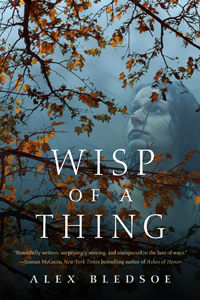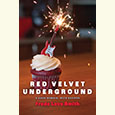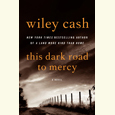Siren Song
Fantasy author Alex Bledsoe delves into Appalachian myth and music
Wisp of a Thing, the new novel by West Tennessee native Alex Bledsoe, hinges on the mysteries of the Tufa, a secretive and storied people bent on protecting the ancient mysteries of their Smoky Mountain community. The Tufa, according to legend, have lived in the mountains and hollows of Cloud County since long before the earliest documented settlers. Known for their dark hair and complexion, they are not Native American, white, or black, and their origins and customs remain disputed and mysterious, even to many who carry Tufa blood themselves.
 Musician Rob Quillen is drawn to Cloud County by a stranger’s promise that a song “on a hill, long forgotten, carved in stone” will heal his broken heart. Physically Rob resembles the Tufa, but he is an outsider—a Bill-Monroe-worshipping songwriter from Kansas City who became famous by appearing on a reality-television competition called So You Think You Can Sing? His decision to compromise his own music by entering the contest results in a highly publicized personal tragedy from which he has not yet recovered. But the prospect of a heart-healing Tufa song leads him into a perilous web of myths, veiled histories, and curses in Cloud County.
Musician Rob Quillen is drawn to Cloud County by a stranger’s promise that a song “on a hill, long forgotten, carved in stone” will heal his broken heart. Physically Rob resembles the Tufa, but he is an outsider—a Bill-Monroe-worshipping songwriter from Kansas City who became famous by appearing on a reality-television competition called So You Think You Can Sing? His decision to compromise his own music by entering the contest results in a highly publicized personal tragedy from which he has not yet recovered. But the prospect of a heart-healing Tufa song leads him into a perilous web of myths, veiled histories, and curses in Cloud County.
Rob’s closest guide through these mysteries is Bliss Overbay, a First Daughter of the Tufa—a position of high standing. Bliss takes her inherited role and its sacrifices very seriously. As both a First Daughter and a musician, she stands in a tough spot, struggling to keep the traditions of her people both intact and hidden as they live, work, and intermarry in the modern world. For the Tufa, music is paramount, but their changing culture raises questions. What then does it mean to stay true to their traditions? Who has the right to sing which songs? And to whom can they be sung?
In this novel, selling out can be a matter of life and death. On the surface, Rob’s role as TV star appears to be a crass contrast to the authenticity of Bliss’s mountain life, but Rob has paid a steep personal price for betraying his high musical principles: a tragic event connected with the show’s final round now tortures him with guilt. In the backwoods of Cloud County, meanwhile, Bliss wages a far more secretive battle against musical corruption: her people can disappear if the wrong songs are merely sung aloud. Rob, as an outsider, has no business in the Tufa’s musical landscape, but Bliss can see that powerful forces have clearly summoned him there for a purpose. “Look around you, Rob,” she explains. “It looks beautiful and serene, doesn’t it? But there’s more blood soaked into these hills than you can imagine. And not all that blood sits quietly. On the right night, at the right time, if the right song is sung, you can see the shades in the moonlight. … Here, songs…do things. Cause things to happen.” The magic that holds the Tufa’s world together also has the power to blow it apart. To help her people, Bliss has no choice but to bring Rob into the dangerous heart of her world.
 As befitting a novel set in the forest hollows of deepest Appalachia, Wisp includes some very dark moments, particularly in its portrayal of women: a cursed feral girl slinking in and out of the dark woods, an unhappy wife on an ugly slide into alcoholism, and a formidable bootlegger so indulgent of her own huge appetites that she must be buried in her bed—these women come uncomfortably close to ugly caricature. In an early scene, Rob runs afoul of an aggressive Tufa faction, one of whom is an enormous woman named Tiffany. As she glares at him, Rob thinks, “most fat people had little pig eyes, but Tiffany had huge, menacing black orbs that looked like they might roll over white like a shark’s.” The first half of the novel teeters on these extreme portrayals, but once the elements of history, music, and magic begin to line up for the final chapters’ stretch of climactic violence and consequences, the limitations of these female characters begin to open up, enriching the story and shifting the balance of power.
As befitting a novel set in the forest hollows of deepest Appalachia, Wisp includes some very dark moments, particularly in its portrayal of women: a cursed feral girl slinking in and out of the dark woods, an unhappy wife on an ugly slide into alcoholism, and a formidable bootlegger so indulgent of her own huge appetites that she must be buried in her bed—these women come uncomfortably close to ugly caricature. In an early scene, Rob runs afoul of an aggressive Tufa faction, one of whom is an enormous woman named Tiffany. As she glares at him, Rob thinks, “most fat people had little pig eyes, but Tiffany had huge, menacing black orbs that looked like they might roll over white like a shark’s.” The first half of the novel teeters on these extreme portrayals, but once the elements of history, music, and magic begin to line up for the final chapters’ stretch of climactic violence and consequences, the limitations of these female characters begin to open up, enriching the story and shifting the balance of power.
Bledsoe threads a tricky needle in Wisp. He tackles Appalachian mountain folk, musicians onstage, and magical creatures—three kinds of characters that often fall prey to easy sentimentality. For the most part, he manages to avoid that misstep, and he does so by continually offering up surprises, imbuing even the most violent passages with empathy and, sometimes, whimsy. This sleight of hand is what ultimately makes Wisp of a Thing a satisfying read.
Alex Bledsoe will read from Wisp of a Thing at The Booksellers at Laurelwood in Memphis July 13, 2013, at 2 p.m. and at Parnassus Books in Nashville on July 14, 2013, at 2 p.m.


